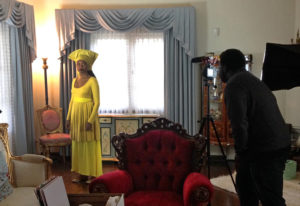 In Part 1, we got to meet ALIZA (uh-LEE-zuh) PEARL, the co-writer and star of THE LISTENER: SPECTRAL AWAKENING (the fan series formally known as Guinan: The Series). Last week, we discussed Aliza’s background as an actor, writer, and producer and also the origins of her project with co-writer and director LAMAR PERRY.
In Part 1, we got to meet ALIZA (uh-LEE-zuh) PEARL, the co-writer and star of THE LISTENER: SPECTRAL AWAKENING (the fan series formally known as Guinan: The Series). Last week, we discussed Aliza’s background as an actor, writer, and producer and also the origins of her project with co-writer and director LAMAR PERRY.
When last we left off, I had just asked about their reaction when they saw the new fan film guidelines from CBS…
JONATHAN – As you were doing your rewrites and as you were preparing for this Guinan series, on June 23, CBS comes out with these lovely fan film guidelines. And what was yours and Lamar’s reaction when you saw those?
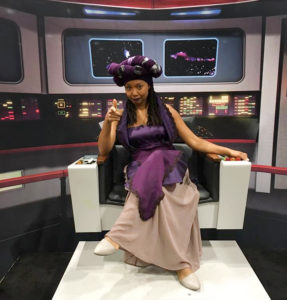
ALIZA – We were anticipating having a “plan B.” We were anticipating that something like that might happen. We follow Axanar; we follow everything that’s been going on with that. So we were like, “Well, what happens if all of a sudden we can’t go forward and call this a Star Trek fan film or we can’t call if Guinan: The Series? Let’s figure this out so that we can not have to scrap this project.
I think it was either April or May, before the fan film guidelines came out, we decided to just make the change. We just decided to preemptively switch the name from Guinan: The Series to The Listener: Spectral Awakening. The script itself, it was inspired by Star Trek, but 95% of what’s in the show and will be seen on screen and the story itself, 95% of it was original. The Star Trek elements were not things that were visibly on the screen. It was so easy to just kind of step back from the things that we had written in as Star Trek-specific things and make them a little more…open to interpretation.
So we were like, “Why don’t we just do that…own the fact that this is our series.” We love Star Trek. We love the legacy and the inspiration it’s given us. But we also are artists, and we’re professional filmmakers, and we didn’t want to feel there was this looming threat of having to can this project that we love so much. So we decided to, instead of wait for it to happen, we decided to just preemptively make the jump ourselves and own it and just kind of boldly go into the original sci-fi series realm and not be known simply as a “fan film” (seeing as how fan films were being scrutinized and reevaluated by CBS and Paramount and the powers-that-be).
JONATHAN – That said, if you’re going to try to crowd-fund, it’s easier to get money from Trekkers if they think you’re making a Star Trek fan film. So how are you going to appeal to those generous donors who give potentially tens if not hundreds of thousands of dollars to Star Trek stuff but don’t necessarily do it when it’s not Star Trek?
ALIZA – Like I said, our script started out as something inspired by Star Trek, and that’s what it still is. We are people who were heavily inspired by Star Trek in the writing of this but also in our lives and in who we are. And I think people will see that when they see our trailer when that comes out. And in the coming months when we’re posting about the other things we’re doing and the designs, the VFX, and all that stuff, it is with the love of Star Trek in our hearts, and the love of Guinan!
The character herself in our series was never called “Guinan.” Even from the beginning, we were like, “Well, her name wouldn’t be Guinan yet. She hasn’t named herself Guinan.” In our minds, that happened when she got to Earth.
JONATHAN – So, are her people called the El-Aurians? Or maybe the Ulurians so it sounds close but you can say, “Oh, it’s not the same word!” Or are they called something completely different…or are you simply not calling them anything at all?
ALIZA – That remains to be seen, to be honest. We shot the trailer with the flexibility of either having them called El-Aurians or not. So that once we put it together, we can make that executive decision on which version to release.
We’re figuring this out along with everyone else. We’re figuring out what this all means to us, and how this will affect our projects and our creativity. And we don’t want to run afoul of the “powers-that-be.” But this is in our hearts.
I don’t consider myself an amateur filmmaker. And if I did, I would probably try to stick to the guidelines. I’m not saying that anyone else should or shouldn’t or anything. I’m just saying that I don’t feel like those guidelines really capture what I’m trying to do in this world…as a filmmaker, as an artist, as a Trek fan. And that’s why we’re like, “Well, let’s figure out something that does work for us…figure out our own path so that we can make this project the way we envision it.”
JONATHAN – And is it basically gonna be 40-45 pages and done…and then you move onto something else in your life? Or are you looking for this to be the beginning of a potentially ongoing web series?
ALIZA – Oh-ho-ho! My friend! My friend! Oh, my goodness! We have SO many ideas for where this could go! I would love nothing more than to do four, five, six seasons of The Listener: Spectral Awakening! I mean, you have this character who we are inspired by who is, like, centuries old…and we know nothing about what she did before this point in time when we saw her on TNG. There are so many stories—oh, my goodness!—it excites me to think about how many stories that we could be telling about this character.
So, yes! The answer is I would LOVE to do many, many more of these. Ideally, to me, this would just be the beginning of a longer set of stories about this character and how she became the character that we know and love from the show.
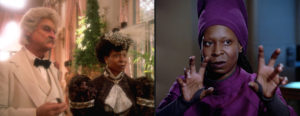
JONATHAN – You and Lamar have just finished filming your first trailer at, of all places, Ares Studios (which is now known as Industry Studios). For those who don’t know, that’s where Axanar was set to be filmed and where Alec Peters has an office. So how did you guys get involved with Alec and decide to film your trailer there?
ALIZA – I think we had both met Alec in different places. I met Alec, I think it was Long Beach Comic Con. I was cosplaying as Tellora from our series, essentially a young Guinan. I was with a photographer friend, and we just walking along the con floor. She was taking pictures of people, and we were talking and chatting with people, and then she was like, “We have to go by my friend’s booth. My friend is volunteering at this booth for a film called Axanar.”
And I had heard of Axanar. I think even Lamar had mentioned it to me before, and I think maybe even a year before I had watched Prelude to Axanar or a trailer for it or something, and I was like, “Oh, my goodness! What is this? This is awesome!” So I said to my friend, “Oh, yeah. I’ve heard of that film. Let’s go to their booth and check it out.”
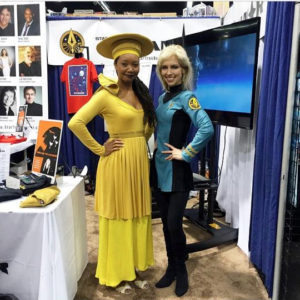
And so my friend brings me to the booth, and Alec was there, and some of the other volunteers and people who work on Axanar were. And I got to meet them all. And I got to just chat and take pictures with them and talk about Axanar and talk about our series and what our vision was for it. And that’s where I made my initial connection with Alec.
So from there, we’ve kept in touch over the past few years, and we’ve given him updates here and there about where the project is. And he’s given us some advice about making a Star Trek-inspired film.
JONATHAN – What kind of advice has he given you?
ALIZA – It was about building a community. I think he’s done a really good job with that, y’know. The Axanar community is very strong and really great…really supportive…people who love Axanar. And so he was really just talking to us a little about that, about how to get people involved, how to get people excited about the project and also build a really healthy community of people around it. And it was in a really organic way that he was talking about. It’s not about trying to get people’s views or likes. It’s really about connecting with people on a personal level and having a shared vision that people are excited about.
JONATHAN – So Alec has been supportive of your project?
ALIZA – Oh, Alec has been so supportive and so inspiring and kind. He’s been really, really great and supportive of us doing this project…in any iteration that we decide to do it.
JONATHAN – And when did you guys decide you wanted to film at Ares Studios.
ALIZA – We actually had a different location that we had planned for. That location fell through, and Alec had said, “Hey, let me know if you want to shoot here.” We had written a different type of trailer that we wanted to shoot in a different type of location. But then when our location fell through, we were like, “Well, what’s available to us?” And so we reached out to Alec, and he said, “Yes, you can totally shoot here.” And so we did some rewrites on the trailer, and then we shot there.
JONATHAN – Did you guys use the giant green screen that they have there?
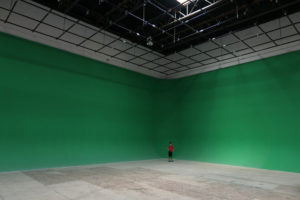
ALIZA – Um, I will leave that to be seen.
JONATHAN – So not even a “yes” or “no” answer, huh?
ALIZA – I just want it to be fresh and a lovely surprise when you see the trailer.
JONATHAN – Okay, fair enough. How long is the trailer going to be when it’s finally cut?
ALIZA – I think like a three to four minute trailer.
JONATHAN – And is it going to be a one-scene trailer, or is it going to be a montage of short snippets cutting from here to there like a movie trailer?
ALIZA – You’ll see. You’ll see.
JONATHAN – You’re not gonna tell me; I understand. Since no other fan film has filmed yet at Industry Studios—except for, of course, Axanar itself—what was that like? What did you think of the facility?
ALIZA – They were very accommodating. That already was, like, just so amazing. I know I keep using the word “supportive,” but I mean it…and that goes for Alec and all of the Axanar folks. They let us come in and do what we needed to do in the space. It was kinda last minute, and they let us have free rein and do what we needed to do and use what we needed to use.
It’s a really cool, amazing open space. I hadn’t shot any of my own stuff, as a producer, in that type of space before. So that was exciting, to use that space.
JONATHAN – But you’ve done commercials, so you’ve filmed in that kind of a space before…just never your own stuff, is that what you’re saying?
ALIZA – Exactly. I’ve been an actor in other people’s stuff—on studio lots and on sets—but to get to produce my own content in that type of space, with that quality, with that size, and with that flexibility was really a treat.
JONATHAN – And since you have been in more professional facilities—real studios and sound stages—there’s a lot of people reading this who, I’m sure, wonder about Industry Studios. So how does Industry Studios compare to the higher-end facilities you’ve worked at?
ALIZA – I would say it’s comparable. You can definitely get some really great, professional stuff there. It also depends on the crew. We brought in our own crew and our equipment and camera and things. And we know how to shoot something. If you come into any space not knowing what to do, you’re gonna need a strong producer and crew that really know how to pull something together.
So the space absolutely lends itself to be this amazing, professional production facility. But you can’t expect to just come in and have your project look perfect without having knowledgeable people behind you.
JONATHAN – So here’s a potential land mine for me to step in, and if you’d rather not answer, that’s fine. But there are very few African American actors and/or production people involved in Star Trek fan films. There are certainly some, and you can see African Americans in several different notable fan productions. But on average, there are many, many more white actors and production crew. In fact, I can think of only two Trek fan series—Starship Valiant and Starship Grissom (both, coincidentally, filmed at Starbase Studios in Oklahoma)—where the captain and/or lead actor is black.
In your fan film, Aliza, you’ve got a black main character, and your producer and co-writer are both African-American. Do you feel there’s any extra importance about the fact that you and Lamar are both African-American, or is that something that you feel shouldn’t matter because fan films should be color-blind anyway?
Hoo boy! I’m guessing you’re definitely gonna want to come back for Part 3 and see how Aliza answers that question! You won’t have to wait long. With Christmas week coming up and things about to slow down a bit here at Fan Film Factor until after the new year, Aliza’s awesome interview will conclude TOMORROW!
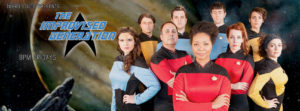 Aliza invites anyone in the southern California area to come enjoy her live comedy group, The Improvised Generation, at the Impro Studio, located at 1727 N. Vermont Ave #211 in Hollywood.
Aliza invites anyone in the southern California area to come enjoy her live comedy group, The Improvised Generation, at the Impro Studio, located at 1727 N. Vermont Ave #211 in Hollywood.
The Improvised Generation creates original, improvised 45-minute episodes in the style of Star Trek: The Next Generation. With new characters and a new ship, this cast of professional performers/Trekkies mix genuine Star Trek reverence with core storytelling techniques to create authentic voyages through the final frontier.
Their new season opens on January 14 and runs on Saturday nights at 9:15 through the end of February. Tickets are $10, and they recommend you order online rather than buying at the door, as they often sell out.
Check the Impro Studio website in January for more information.

https://www.youtube.com/watch?feature=player_embedded&v=8tV1-7jns6Q
Prepping a big blog for them–they’re one of of my favorites! A few nights ago, I researched the dutch merchant ship Batavia. I hadn’t realized they were giving us a major clue the entire time!!!
Jonathan, I’m glad to “hear” that :).
Mmm, Star Trek introduced the first black woman as important character, the first interracial kiss, the first female Captain (Janeway), and Sisko as a black main character of a whole series and many other first things. Why wouldn’t the fans do the same ? After all, fans are fans, regardless of their skin color, their nationality or sexual preference.
One of the values of Star Trek is tolerance, or preferably open mind, and Guinan seems the best character to illustrate this. Her potential of experienced stories is just huge, so the series is promising and seems in good hands.
Fans was doing it too. Remember famous gay storyline from Hidden Frontier, and New Voyages’ “Blood and Fire” episode.